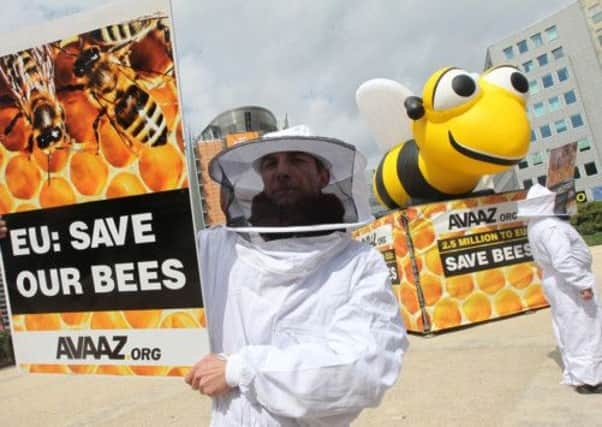EU governments back bee pesticide ban


European Union member states voted yesterday by 15-8, with four abstentions, in favour of the controversial two-year moratorium on the use of three key pesticides, known as neonicotinoids.
The ban is expected to be introduced by the European Commission shortly, to take effect at the end of the year.
Advertisement
Hide AdAdvertisement
Hide AdIt is a victory for campaigners including the Scottish Wildlife Trust (SWT) who believe the moratorium will play a key role in ensuring the survival of the world’s bee populations.
The Scottish Government, which had called for a delay on a ban until 2015 in order to gather more information, yesterday conceded that restrictions “could be justified despite inconclusive science”.
Westminster, which voted against the ban, maintained that the evidence did not support the move, even though a key study upon which the UK based its stance was recently branded seriously flawed.
The British and Scottish Beekeepers’ associations also opposed the ban now due to begin in December, over concerns that farmers will revert to using other insecticides definitely known to harm bees.
Announcing yesterday’s vote, Tonio Borg, European Union health and consumer commissioner, said: “The necessary qualified majority was not reached [so] the decision now lies with the commission… [which] will go ahead with its text in the coming weeks.”
SWT chief executive Simon Milne said the vote was “good news for wildlife, farmers, gardeners and society” and urged the SNP to work swiftly towards implementing the ban.
Scottish Environment Minister Richard Lochhead said the government would do so but added: “Between now and then there is the opportunity for further research to be undertaken so that we can be certain that our bee populations are not threatened.”
UK environment minister Lord de Mauley said: “Significant countries agree with us that a ban is not the right action to take and we will work with them to get much better evidence. We will now work with farmers to cope with the consequences as a ban will carry significant costs for them.”
Advertisement
Hide AdAdvertisement
Hide AdA spokesman for the British Beekeepers’ Association said: “Now they have decided to introduce this ban they must push ahead with this research into the actual impacts of neonicotinoids and the risks associated with the alternatives.”
Bees and other insects are believed to save Scottish farmers around £43 million per year by providing a “free pollinating service”.
Scottish farming body NFU Scotland said yesterday that it remained convinced that more field-based research was “essential” and welcomed a commitment to further studies.
NFU Scotland policy manager, Andrew Bauer, urged Scottish farmers to use the “window of opportunity” between now and December to seek professional advice over any changes to crop treatments which they may need to make.
Greenpeace EU agriculture policy director Marco Contiero said the vote made it “crystal clear” that there was “overwhelming scientific, political and public support for a ban”.
He added: “Those countries opposing a ban have failed.”